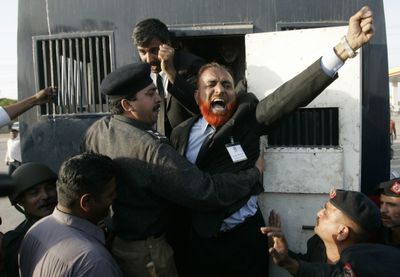U.S., Britain try to prevent political collapse in Pakistan

LAHORE, Pakistan – The United States and Britain made a last-ditch effort Thursday to avert the collapse of nuclear-armed Pakistan’s government, calling on the country’s two major political parties to reach a compromise and avoid what many fear could be a violent confrontation next week.
However, opposition leader Nawaz Sharif showed no signs of backing down from plans to stage a countrywide “long march” culminating in a massive rally Monday in the capital of Islamabad, and state authorities, under orders from President Asif Ali Zardari, arrested and beat dozens of activists in Karachi and blocked roads out of the city.
Anne Patterson, the U.S. ambassador to Pakistan, went to see Sharif at his base in Lahore and later took part in a conference call with Zardari and Richard Holbrooke, the U.S. special envoy to Pakistan and Afghanistan, who’s based in Washington. The call lasted 30 minutes, according to Zardari’s office, prompting speculation that the discussion included details of a possible compromise.
David Miliband, the British foreign secretary, telephoned Zardari separately Thursday.
Political insiders in both parties said that U.S. and British officials had been involved in intense, detailed mediation, concerned that key anti-terrorist ally Pakistan had become engulfed in political infighting rather than tackling the Islamic extremists on its soil.
A deal would give Sharif a chance to re-establish the provincial government in Punjab, which his party controlled until Zardari dismissed it last week, according to those familiar with the discussions.
Sharif’s planned five-day protest march is intended to call for an independent judiciary and for the reinstatement of former Chief Justice Iftikhar Mohammed Chaudhry. Under the proposed compromise, Chaudhry would return to office, but under terms that either would limit his powers or see him subsequently retire.
Sharif appears reluctant to cut a deal, however, and many think he’s betting that he can bring down the government and win the elections that would follow.
Security forces have arrested as many as 1,000 activists since Tuesday night. On Thursday they beat and rounded up lawyers, opposition politicians and human rights campaigners outside the high court in the southern port city of Karachi. They arrested about 100 activists in Karachi and 150 in the southern city of Hyderabad, including several leading lawyers.